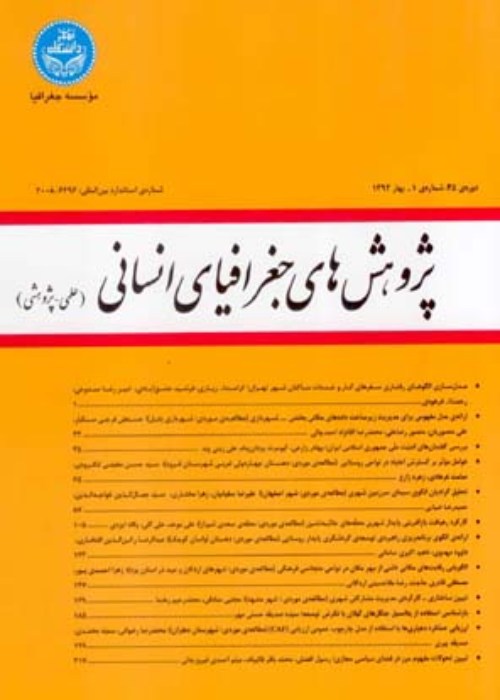An exploration of the role of social and cultural factors in the formation of local government in Iran based on systems thinking approach
Author(s):
Article Type:
Research/Original Article (دارای رتبه معتبر)
Abstract:
Introduction
The increasing growth of local and public institutions and their necessity in managing the general affairs of the country and the localization process of handling the general affairs in the final decade of the twentieth and the initial decade of the twenty first centuries have changed the status of local government as an indispensable reality in the World (Hafeznia, et al., 2012, p. 148). The geographical places and regions require local autonomy and management for a better management of the affairs, the horizontal and vertical planning of relations with other regions and the establishment of institutions and organizations. Such independencies and the political management of space in the local domain are referred to as the local government or state in the geopolitics literature (Ibid, p. 1). Conceptually, local government or state is a political-administrative structure which is the result of spatial distribution of political power process that is created by the central government. In other words, it is a process which causes decision-making, implementation and supervision of local affairs, in the framework of general policies of central government, to be assigned to the public institutions and organizations (like councils, associations, civil society and the institutions of arbitration and elders) and authorities and governmental associations (like Governor, county, state offices) (Hafeznia , 2010, p. 36). The research conducted in this regard indicates that there are a variety of influential factors in the creation of local governments (Moghimi, 2004). Such influential factors can be classified in five aspects: sociocultural, political, legal- judicial, financial-economic and geographical (Ibid,p.9). for the construction of local government different factors like influential factors in the formation domain, challenges and opportunities, which come to existence with the formation of local governments, should be taken into consideration and considering the role of systemic thinking in this domain is highly essential ( Moghimi, 2012, p. 107-108). Based the above-mentioned ideas, the present study attempts to identify the influential factors in the formation of local government in Iran based on the systemic thinking approach and in a sociocultural framework. In fact, the main objective of the study is modelling the influence of sociocultural factors in the creation of local government within the framework of systemic thinking by using Vensim software.
Methodology
The current research study investigates the role of sociocultural factors in the formation of local government in Iran and due to the importance and effective role of systemic thinking in different domains of planning and management this investigation is conducted using this approach. The method of study is descriptive-analytical and inferential and based on the results and objectives can be considered as an applied and exploratory research, respectively. More generally the present study is conducted to identify and prioritize the influential factors and to examine their relationship in the formation of local government in Iran and to recognize the existing challenges in the sociocultural aspect and finally to model the influential factors in a systemic thinking framework for the formation of local governments in Iran. For such purposes, at first based on the library studies and the systemic thinking approach, the influential factors were determined and the relationship between these factors and with the necessity of forming local governments in Iran were examined by using quantitative and qualitative studies and methods. In the quantitative method, the use is made of questionnaire which is based on the Likert scale ranging from 1 very few and 5 very much responses and its reliability has been determined by using Cronbach alpha. The participants of the study were forty scholars in the field of local government and were selected based on the researchers’ estimations. In the qualitative phase, seven experts were selected based on the snowball sampling method. For investigating the extent of effects of the sociocultural factors in the formation of local government in Iran and for prioritizing the extent of effect of each of the components in the sociocultural aspect, the researchers used independent samples t-test and Friedman test, respectively. In order to design the cause and effect diagrams, based on the systemic thinking approach, the Vensim software was sued.
Results and Discussion
For the successful formation of local government in Iran, the effective sociocultural factors must be identified and the upcoming challenges should be removed and in such a process systemic thinking which is capable of solving complicated managerial issues has a great potential. In other words, for recognizing the influential factors in the formation of local governments, we should investigate and analyze them as a system. In this study, the attempts have been made to identify and prioritize the influential sociocultural factors and to explore their relationship with each other to shed some light on their effects in the formation of local government in Iran and their modeling in a systemic thinking framework. By studying the literature on the issue, factors such as ethnic-linguistic diversity, the increase in the awareness of people in the rather deprived areas, the religious diversity, people’s attention and tendency towards democracy, increase in the local and national requests, existence of sense of belonging to a place and localizing tendencies, existence of common local assets and needs, increase in the contribution of people and development from the bottom with reviving the local capabilities were extracted as influential factors. The results of interviews conducted added other influential factors: increase in informational networks, the continuation of ethnic-religious domain over the borders, human talents and abilities in each environment and the growth of urban residents. It can be asserted that the set of above mentioned factors are highly influential in the formation of local governments in the sociocultural aspect.
Conclusion
The findings of the study reveal that the sociocultural aspect is one of the important and influential aspects in the formation of local government in Iran. In addition, according to the quantitative part (the statistical data of the research) and the qualitative part (the interviews) the research indicates that among the extracted influential sociocultural factors the ethnic-linguistic variety, the existence of spatial senses and localization tendencies and also the existence of national and local demands, due to their highKeywords:
Language:
Persian
Published:
Human Geography Research Quarterly, Volume:50 Issue: 105, 2018
Pages:
537 to 554
magiran.com/p1913549
دانلود و مطالعه متن این مقاله با یکی از روشهای زیر امکان پذیر است:
اشتراک شخصی
با عضویت و پرداخت آنلاین حق اشتراک یکساله به مبلغ 1,390,000ريال میتوانید 70 عنوان مطلب دانلود کنید!
اشتراک سازمانی
به کتابخانه دانشگاه یا محل کار خود پیشنهاد کنید تا اشتراک سازمانی این پایگاه را برای دسترسی نامحدود همه کاربران به متن مطالب تهیه نمایند!
توجه!
- حق عضویت دریافتی صرف حمایت از نشریات عضو و نگهداری، تکمیل و توسعه مگیران میشود.
- پرداخت حق اشتراک و دانلود مقالات اجازه بازنشر آن در سایر رسانههای چاپی و دیجیتال را به کاربر نمیدهد.
دسترسی سراسری کاربران دانشگاه پیام نور!
اعضای هیئت علمی و دانشجویان دانشگاه پیام نور در سراسر کشور، در صورت ثبت نام با ایمیل دانشگاهی، تا پایان فروردین ماه 1403 به مقالات سایت دسترسی خواهند داشت!
In order to view content subscription is required
Personal subscription
Subscribe magiran.com for 70 € euros via PayPal and download 70 articles during a year.
Organization subscription
Please contact us to subscribe your university or library for unlimited access!



